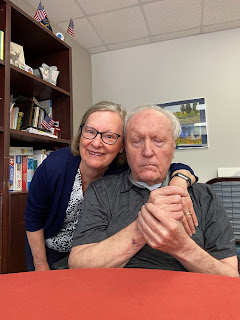It has been over 15 years since Bob and I began our journey of living with Alzheimer’s Disease. Bob is now in the advanced stage of it. He can no longer walk, talk, dress or feed himself.
I am writing this entry with the hope of aiding others in their journey through this devastating disease. Bob was always one to jump in to help others in need. Hopefully, I am continuing this legacy.
Most people who suffer with some sort of dementia were bright and contributing members of society. Bob held a master’s degree in civil engineering. He was director of environmental management at Hill Air Force Base, with over 17,000 employees under his direction. Before Alzheimer’s, he was always engaged in productive activity. He was also a loving husband, caring dad, and playful grandpa. Slowly, his intelligence, memory, talents and engaging personality were taken away from him. Life became extremely difficult for him and for our family.
Here are four things that helped Bob and me along this care-taking journey:
- Learn as much as you can about this disease through:
Reading Materials - In the beginning I read many books about Alzheimer’s written by doctors, caregivers, and even people who were experiencing this disease. I also obtained information on line from the Alzheimer’s Association and other sites.
Documentaries - Charlie Rose and Maria Shriver are two I found helpful, as well as many others I found on the internet, by way of YouTube.
Support Groups - Contact local Alzheimer’s Association for times and locations. My support groups helped me immensely. When Bob ran away in the middle of the night, they gave me an excellent solution, so it wouldn’t happen again. They suggested installing a door knob backwards, so I could lock us in our bedroom at night. ( Obviously, I hid the key!) It worked wonderfully in keeping Bob safe.
2. As the disease progresses, ask/accept support from family and friends. I couldn’t have kept Bob home for as long as I did without the support of our children, grandchildren and our siblings and their spouses. They gave me weekly mornings off from caring for Bob, brought meals, helped us move, helped me with behavioral emergencies (caused by the disease), listened to me when I needed to talk, and were my best cheerleaders.
3. Medications saved us. Further along the Alzheimer’s journey, anxiety, anger and impulsive behavior become a big problem. When Bob started jumping out of our moving car, I knew I needed something to calm him down. Our primary care doctor gave us a prescription that greatly helped.
4. Support Beyond Family - Six years ago, Bob’s care became more than I and my family could handle. It was becoming impossible to shower him. He was experiencing incontinence, and not wanting help with it. Thankfully, an opening at the Salt Lake William E. Christofferson Veterans Home became available, at exactly the right time. I can’t say enough about the excellent and loving care he is receiving there.
I have friends who have hired full-time care in their homes for their loved ones. Both of these solutions are good, but also expensive. You may have enough family and/or friends who can help full time on a rotating basis. Keep in mind that down the road, your loved one will likely be confined to a wheel chair, which applies to Bob now. Many homes, mine included, are not wheel chair friendly.
When Bob became a resident at the VA, I can’t express in words how important it was for him to have frequent family visits. In the first three years, Bob was able to interact with us. I loved hearing him tell me he loved me.
Now, when I visit him, he usually doesn’t acknowledge my presence at all. When I come, he is sitting at a table in his wheelchair with his head down and eyes closed. I usually come at meal time, so that I can feed him his pureed meals. After he eats, I hold his hands, give him a back rub, and stroke his cheeks. When I leave, I always kiss his forehead and tell him I love him. I want him to feel nurtured and loved by me, at least for a few minutes.
I feel sad that some of the men in the memory care unit, with Bob, hardly ever get visitors. When I go, I love chatting with residents who are still able to communicate.
Some Alzheimer’s journeys are short. Others, like Bobs, are lengthy. Either way, the journey is difficult. I can’t end without saying how much my faith and hope in God has given me peace that everything is and will be all right.

















